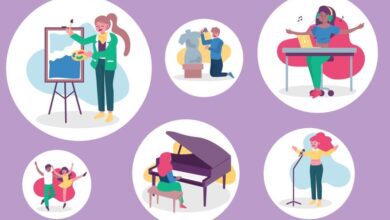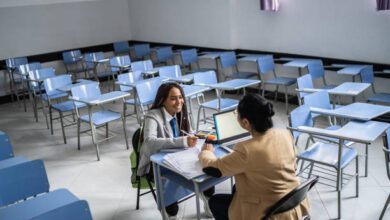Exploring the Importance of Non Formal Education meaning in Urdu Culture


Non formal education is a term that may sound unfamiliar to some, but it holds great significance in the Urdu culture. It refers to the type of learning that takes place outside of the traditional classroom setting and is not necessarily structured or regulated by formal institutions. In Urdu, it is known as “غیر رسمی تعلیم”, which literally translates to “informal education”. This form of education has been a part of the rich cultural heritage of Urdu for centuries and has played a crucial role in shaping the society. In this blog post, we will delve into the meaning of non formal education meaning in Urdu culture and explore its importance in today’s world.
Understanding Non-Formal Education and Its Significance
Non-formal education holds great significance in the Urdu culture, as it refers to the type of learning that takes place outside of the traditional classroom setting and is not necessarily structured or regulated by formal institutions. In Urdu, it is known as “غیر رسمی تعلیم”, which literally translates to “informal education”. This form of education has been a part of the rich cultural heritage of Urdu for centuries and continues to play a crucial role in shaping the society.
Understanding the meaning of non-formal education is essential in appreciating its significance within the Urdu culture. While formal education provides structured and regulated learning in classrooms, non-formal education offers a more flexible and dynamic approach. It encompasses a wide range of learning activities that are not tie to specific curricula or certifications. It can be seen in various forms, such as community-base workshops, mentorship programs, apprenticeships, religious gatherings, cultural events, and storytelling traditions. These activities foster creativity, critical thinking, practical skills, and character development among individuals, making it an integral part of the holistic education process.
Non-formal education plays a significant role in the Urdu-speaking
Non-formal education plays a significant role in the Urdu-speaking community by bridging gaps in formal education systems. Many individuals, especially those in marginalized or disadvantaged communities, may not have access to quality formal education due to various reasons, such as financial constraints, social barriers, or geographical limitations. Non-formal education serves as a lifeline for these individuals, providing them with opportunities to gain knowledge, develop skills, and empower themselves.
Furthermore, non-formal education in the Urdu culture helps preserve and promote the rich cultural heritage and traditions. It serves as a means of transmitting cultural values, history, and customs from one generation to another. Through storytelling, poetry recitation, folk music, and traditional arts and crafts, the Urdu-speaking community keeps its cultural identity alive and ensures that its values and traditions are pass on to future generations.
The Role of Non Formal Education in the Urdu-speaking Community
Non formal education plays a vital role in the Urdu-speaking community, addressing the unique needs and challenges faced by individuals within this cultural context. It serves as a catalyst for social change, empowerment, and personal growth.
One of the key roles of non formal education in the Urdu-speaking community is bridging the gaps in the formal education system. Many individuals, especially those from marginalized or disadvantaged backgrounds, face barriers that hinder their access to quality formal education. These barriers can be financial constraints, social discrimination, or geographical limitations. non formal education meaning in urdu steps in to fill these gaps by providing alternative avenues for learning. Through workshops, mentorship programs, and apprenticeships, individuals can acquire knowledge, develop skills, and gain practical experience that would otherwise be inaccessible to them.
Another crucial role of non formal education in the Urdu-speaking community
Another crucial role of non formal education in the Urdu-speaking community is preserving and promoting cultural heritage. Urdu culture is deeply rote in traditions, values, and customs that have been pass down through generations. Non formal education serves as a platform for transmitting these cultural aspects from one generation to another. Whether through storytelling, poetry recitation, or traditional arts and crafts, non formal education ensures that the rich cultural heritage of Urdu remains alive and vibrant.
Additionally, non formal education fosters a sense of community and social cohesion within the Urdu-speaking community. It brings people together through shared interests and passions, allowing for the exchange of ideas and the formation of supportive networks. This sense of community not only strengthens individuals’ sense of belonging but also encourages them to contribute to the betterment of society.
Case Studies Illustrating the Impact of Non Formal Education in Urdu Culture
Non formal education in Urdu culture has had a profound impact on individuals and communities, and its significance can be best understood through real-life case studies. Let’s explore some examples that highlight the transformative power of non formal education in Urdu culture.
One such case study involves a young girl named Aisha. She comes from a low-income family in a rural village, where access to formal education is limit. However, Aisha’s passion for storytelling and poetry is nurtured through non formal education programs in her community. Through storytelling workshops and poetry recitation events, Aisha not only develops her literary skills but also gains confidence and self-expression. These newfound skills enable her to share her stories and poems, capturing the hearts of her community and inspiring others to pursue their passions.


Another case study involves a group of young boys from a marginalized urban neighborhood.
These boys face numerous challenges, including lack of educational resources and exposure to negative influences. However, through a non formal education program that focuses on traditional arts and crafts, these boys find solace and purpose. They learn the art of pottery, calligraphy, and miniature painting, not only preserving the cultural heritage but also developing a sense of identity and pride. These skills not only become a means of self-sustainability but also empower them to break the cycle of poverty and contribute positively to society.
In these case studies, we see that non formal education provides opportunities for personal growth, skill development, and empowerment, even in the absence of formal schooling. It fosters a sense of community, preserves cultural heritage, and opens doors to a brighter future. Non formal education meaningfully impacts the lives of individuals, transforming them into confident, skilled, and culturally rooted individuals who can contribute positively to their communities.
These case studies illustrate the impact of non formal education in Urdu culture, and they are just a glimpse of the transformative power it holds. Through its flexibility, accessibility, and focus on holistic development, non formal education meaning in urdu plays a vital role in shaping the Urdu-speaking community, ensuring that knowledge, skills, and cultural values are pass down from one generation to another, enriching the society as a whole.
Future Prospects of Non Formal Education within Urdu Society
Non formal education holds great potential for the future of Urdu society. As we continue to recognize its importance and value, there are several areas where non formal education can further flourish and make a lasting impact.
One of the key prospects for non formal education in Urdu society is its integration with formal education systems. By bridging the gap between formal and non formal education, we can create a more holistic and inclusive learning environment for all individuals. This can be achieve through collaborations between formal institutions and non formal education providers, such as community organizations or NGOs. By incorporating elements of non formal education into the formal curriculum, students can benefit from a more well-rounded and practical education that encompasses both academic knowledge and real-world skills.
Furthermore, technology presents an exciting avenue for the future of non formal education in Urdu society. With the advancements in digital learning platforms, online courses, and virtual mentorship programs, non formal education can become more accessible to individuals across different geographical locations and socioeconomic backgrounds. This can open up a world of opportunities for those who may not have access to traditional educational resources. By leveraging technology, we can ensure that non formal education reaches even the most remote areas, empowering individuals to learn and grow.
Additionally, community engagement and empowerment should be at the forefront of the future prospects of non formal education in Urdu society. By actively involving community members in the design and implementation of non formal education programs, we can ensure that they meet the specific needs and aspirations of the Urdu-speaking community. This participatory approach fosters a sense of ownership and responsibility among community members, allowing them to actively contribute to the growth and development of their own communities.
Conclusion
In this blog post, we have explored the meaning and significance of non formal education in Urdu culture. We have seen how this form of education, known as “غیر رسمی تعلیم”, goes beyond the boundaries of traditional classroom settings and formal institutions. Non formal education encompasses a wide range of learning activities that foster creativity, critical thinking, practical skills, and character development. It plays a vital role in bridging gaps in the formal education system and provides opportunities for individuals, especially those in marginalized or disadvantaged communities, to gain knowledge, develop skills, and empower themselves.
Throughout this post, we have examined various case studies that illustrate the transformative power of non formal education meaning in urdu culture. From Aisha, the young girl who discovered her passion for storytelling and poetry through community workshops, to the group of boys who found purpose and pride in traditional arts and crafts, these examples demonstrate how non formal education positively impacts the lives of individuals and communities.
Looking to the future, we see great prospects for non formal education within Urdu society.
By integrating it with formal education systems, we can create a more inclusive and well-rounded learning environment. Leveraging technology, such as online courses and virtual mentorship programs, can make non formal education more accessible to individuals across different backgrounds and geographical locations. Additionally, community engagement and empowerment should be at the forefront, ensuring that non formal education programs meet the specific needs and aspirations of the Urdu-speaking community.
Non formal education holds great meaning and importance in Urdu culture. It is a dynamic and flexible form of learning that plays a crucial role in shaping individuals, communities, and society as a whole. By embracing the value of non formal education and exploring its future prospects, we can ensure that knowledge, skills, and cultural values continue to be pass down from one generation to another, enriching the Urdu culture and fostering personal growth and empowerment.



